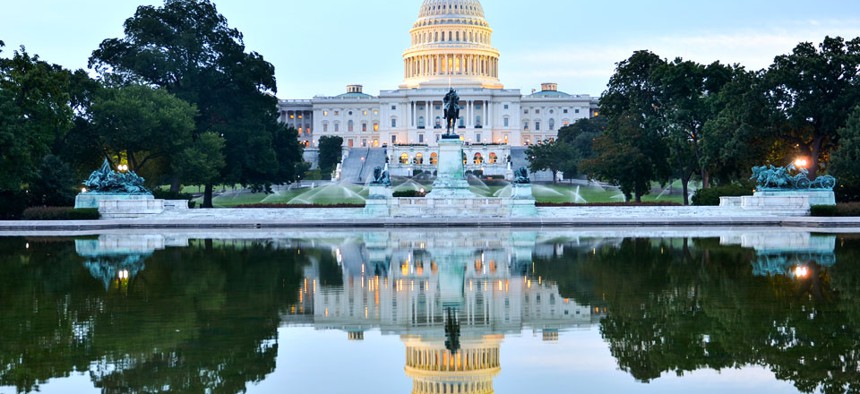
Orhan Cam/Shutterstock.com
House Lawmakers Seek to Prevent Defense Civilian Furloughs
Spending bill amendments would bar department from forcing employees to take unpaid leave in fiscal 2014.
Update: The House has voted to halt civilian furloughs at the Defense Department. See our story here.
Bipartisan amendments to the Defense spending bill would prohibit the department from furloughing civilian employees in fiscal 2014 because of sequestration.
The two measures specifically would ban the department from using any budget funds to implement civilian furloughs during the next fiscal year. One would apply to all civilian Defense workers subject to unpaid leave; the other would protect from furlough those employees paid out of working capital funds. The House on Tuesday afternoon began debate on the fiscal 2014 Defense Appropriations Act and more than 100 amendments to the legislation, including those related to civilian furloughs. The chamber is expected to vote on final passage this week.
More than 650,000 civilian Defense employees are on furlough for 11 days through Sept. 30.
The International Federation of Professional and Technical Engineers urged lawmakers to support the amendments that would “defund” sequestration-related furloughs of civilian workers. The union pointed out that Congress tried to ensure the department avoided furloughs in fiscal 2013 by shifting $10 billion into the account that pays employee salaries. “Despite giving DoD the flexibility needed to meet their sequestration responsibilities, and pay all salaries, the Pentagon nonetheless made the decision to continue forward with an 11-day furlough for most DoD workers,” wrote IFPTE President Gregory Junemann in a July 23 letter to House lawmakers. The Pentagon reduced the number of furlough days from 22 to 14 in May after Congress approved its request to transfer funds, and later whittled unpaid leave down to 11 days.
The two separate amendments -- one offered by Republican Doug Lamborn of Colorado and Democrat Beto O’Rourke of Texas, and the other by Republican Tom Cole of Oklahoma and Democrat Derek Kilmer of Washington -- do not eliminate sequestration. No provisions in the legislation would reverse the mandatory, across-the-board budget cuts in fiscal 2014, which Democrats criticized. Rep. Chris Van Hollen, D-Md., said during floor debate on Tuesday that the bill does nothing to deal with sequestration, arguing that the department would have to cut about $48 billion from the $512.5 billion spending package if sequestration continues into the next fiscal year. Van Hollen has offered several unsuccessful amendments to various legislation and stand-alone bills to reverse sequestration.
The Defense spending bill also provides a 1.8 percent pay raise for members of the military next year, the same amount in the authorization legislation the House passed in June. President Obama proposed a 1 percent pay raise for military personnel in 2014, which is what the current Senate defense authorization bill recommends. If the Senate sticks with the 1 percent pay raise, then lawmakers will have to reach consensus during conference committee on the final amount to give service members. Current law mandates a 1.8 percent boost for service members for 2014; the formula for determining service members’ annual pay increase is based on the Bureau of Labor Statistics' Employment Cost Index and the growth in private-sector wages.
The House Defense appropriations legislation does not provide money for a civilian pay increase in 2014; none of the House fiscal 2014 spending bills so far contain funds for a civilian pay hike. The Senate has not yet passed any fiscal 2014 spending bills, although the upper chamber resumed consideration of the fiscal 2014 Transportation-Housing and Urban Development bill on Tuesday.
House lawmakers also will consider two Defense spending amendments this week that would prohibit funds from being used to plan or implement new rounds of military base closures and reorganizations, known as BRAC. The Obama administration proposed new BRAC rounds in its fiscal 2013 and 2014 budget recommendations.
The White House on Monday threatened to veto the Defense spending bill if it reaches the president in its current form. The statement of administration policy specifically took issue with the legislation’s pay provisions and rejection of the administration’s recommended fee increases to TRICARE, the military’s health care system. The administration “strongly urged” Congress to set the military pay raise at 1 percent.
“Consistent with the views of the uniformed military leadership, the president’s budget requests a 1 percent increase to basic pay, a 4.2 percent increase in the basic allowance for housing, and a 3.4 percent increase in basic allowance for subsistence. This total compensation level recognizes the sacrifices made by the men and women in our armed forces, while adhering to the current budget constraints faced by DoD,” the administration said. The policy statement also urged Congress to support the 1 percent pay hike for federal civilian employees as “a permanent pay freeze is neither sustainable nor desirable.”
As for TRICARE, the administration said it was “disappointed” that lawmakers have “consistently failed to support requested TRICARE fee initiatives that seek to control DoD’s spiraling health care costs while keeping retired beneficiaries’ share of these costs well below the levels experienced when the TRICARE program was implemented in the mid-1990s.”
(Image via Orhan Cam/Shutterstock.com)







